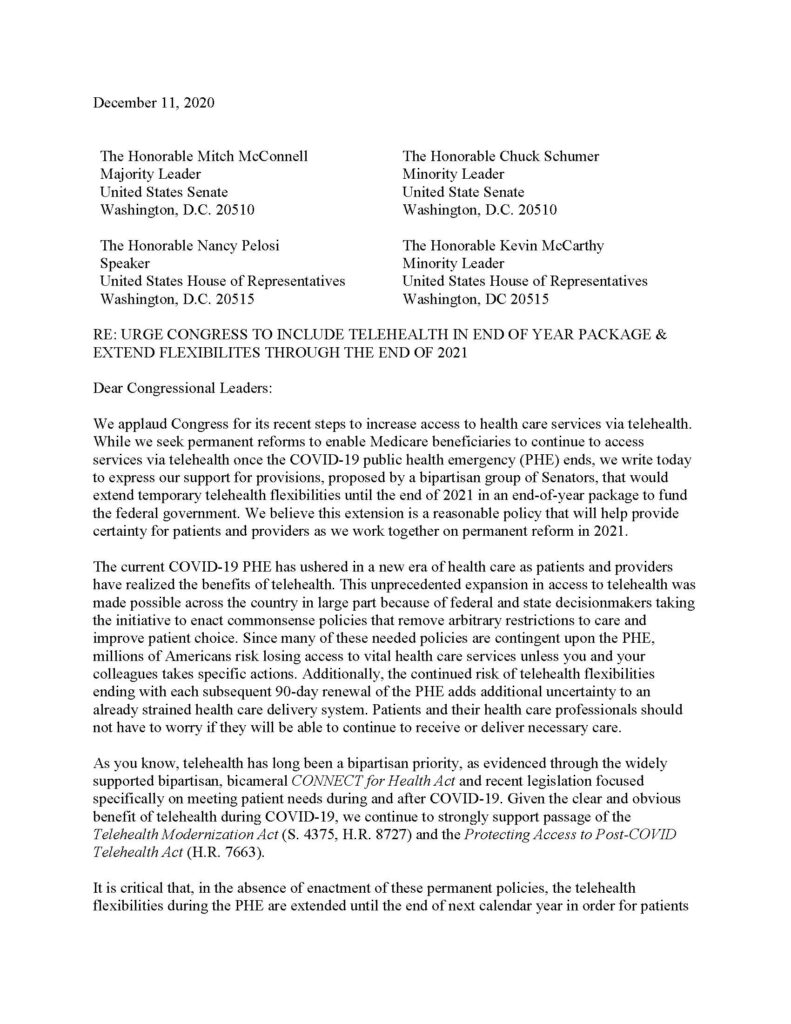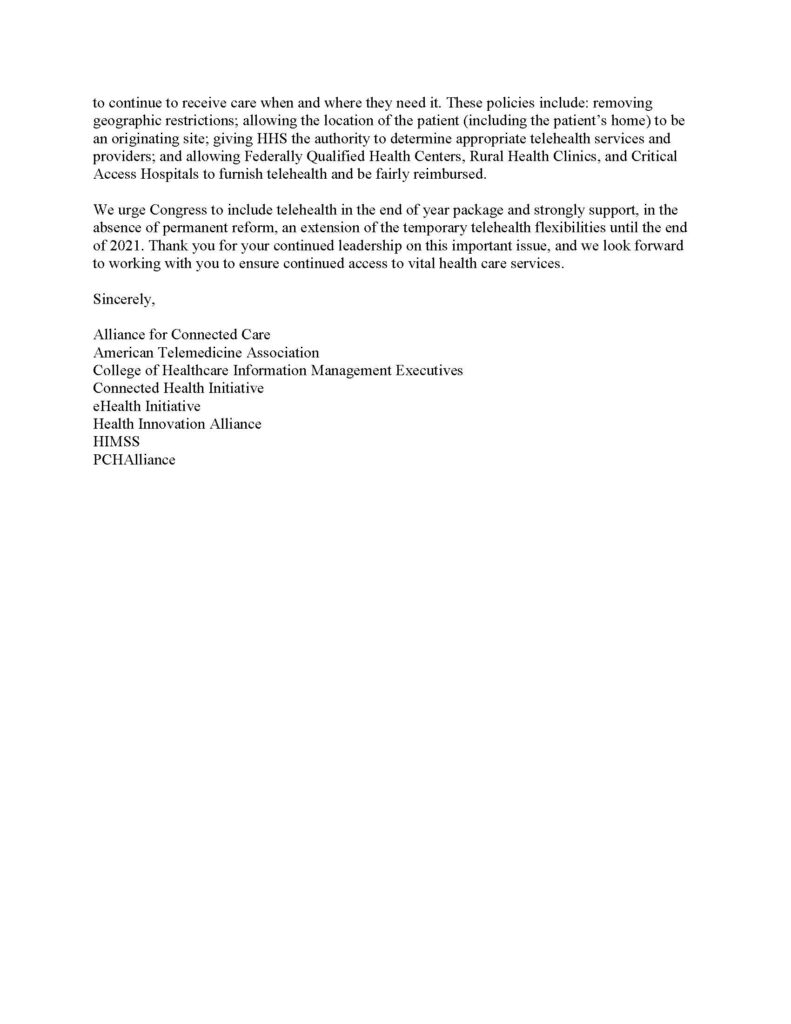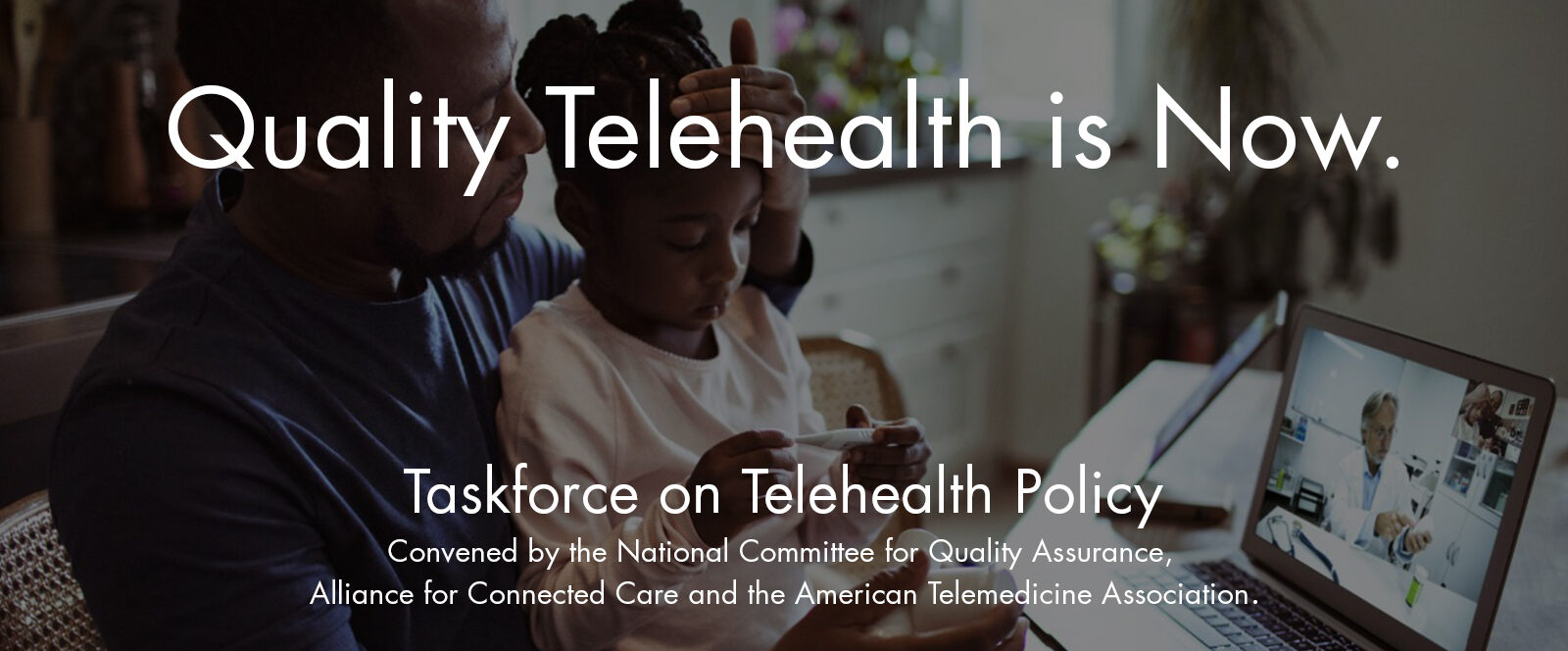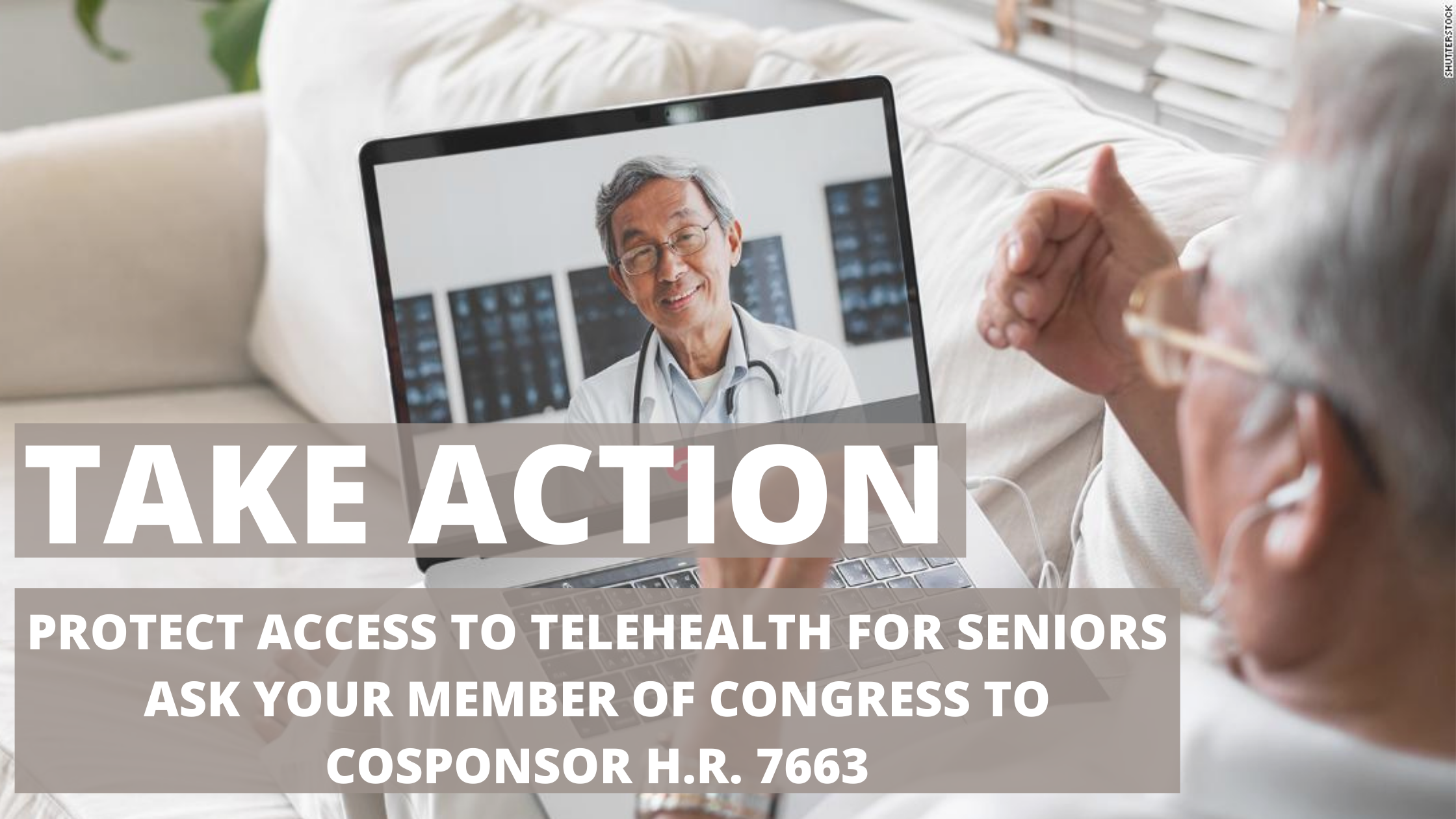Input for the CONNECT for Health Act of 2021
The Alliance for Connected Care provided feedback on the Senate Telehealth Working Group and Congressional Telehealth Caucus’ request for information (RFI) on
the 117th Congress’ iteration of the Creating Opportunities Now for Necessary and Effective Care Technologies (CONNECT) for Health Act.
The Alliance provided 1) overarching comments about top priorities for telehealth legislation, 2) recommend new provisions for inclusion in the CONNECT package and 3) provide feedback on the continued relevancy of 2019 CONNECT provisions.
Review the Alliance’s comments here and below
 Loading...
Loading...
Alliance Joins Letter to Hill in Support of Temporary Extension of DEA Waiver in COVID Relief Package
The $908 Billion Bipartisan Emergency COVID Relief Act of 2020 – While its outcome remains very much in doubt, the $908 Billion bipartisan compromise proposal put forward in the Senate includes a provision to temporarily extend the DEA waiver of the in-person requirement through the end of 2021.
We urge Congress to extend the Drug Enforcement Administration (DEA) waiver of the prior in-person requirement before telemedicine is allowed for prescribing of controlled substances under the Ryan Haight Act through the end of 2021. The DEA has waived this requirement for the duration of the COVID-19 Public Health Emergency (PHE). To provide stability and time for work on a more permanent policy, the waiver should be extended at least until the end of 2021. This provision is included in the $908 billion Bipartisan Emergency COVID Relief Act of 2020.
View the letter
 Loading...
Loading...
Digital Health Groups Call on Congress to Extend Telehealth Access
The Alliance for Connected Care, American Telemedicine Association, College of Healthcare Information Management Executives, Connected Health Initiative, eHealth Initiative, Health Innovation Alliance, HIMSS and the PCHAlliance called on Congressional leaders to act to preserve access to telehealth as part of an end of year package.
“While we seek permanent reforms to enable Medicare beneficiaries to continue to access services via telehealth once the COVID-19 public health emergency (PHE) ends, we write today to express our support for provisions, proposed by a bipartisan group of Senators, that would extend temporary telehealth flexibilities until the end of 2021 in an end-of-year package to fund the federal government. We believe this extension is a reasonable policy that will help provide certainty for patients and providers as we work together on permanent reform in 2021.”
“Since many of these needed policies are contingent upon the PHE, millions of Americans risk losing access to vital health care services unless you and your colleagues takes specific actions. Additionally, the continued risk of telehealth flexibilities ending with each subsequent 90-day renewal of the PHE adds additional uncertainty to an already strained health care delivery system. Patients and their health care professionals should not have to worry if they will be able to continue to receive or deliver necessary care.”
Read the Letter to Congressional Leaders on Extending Telehealth Flexbilities 12-11-2020


Milken Institute 2020 Future of Health Summit
Milken Institute 2020 Future of Health Summit, “Realizing the Promise of Telehealth During the Pandemic and Beyond.”
Alliance Executive Director Krista Drobac joined the Milken Institute in a telehealth panel to discuss the rapid shift to telehealth during the COVID-19 pandemic and whether telehealth will allow us to spread access to health services and help foster health equity and narrow the disparities in health outcomes across underserved communities.
Remote Optimization of Guideline-Directed Medical Therapy in Patients With Heart Failure With Reduced Ejection Fraction
Remote Optimization of Guideline-Directed Medical Therapy in Patients With Heart Failure With Reduced Ejection Fraction
Importance: Optimal treatment of heart failure with reduced ejection fraction (HFrEF) is scripted by treatment guidelines, but many eligible patients do not receive guideline-directed medical therapy (GDMT) in clinical practice.
Objective: To determine whether a remote, algorithm-driven, navigator-administered medication optimization program could enhance implementation of GDMT in HFrEF.
Design, setting, and participants: In this case-control study, a population-based sample of patients with HFrEF was offered participation in a quality improvement program directed at GDMT optimization. Treating clinicians in a tertiary academic medical center who were caring for patients with heart failure and an ejection fraction of 40% or less (identified through an electronic health record-based search) were approached for permission to adjust medical therapy according to a sequential titration algorithm modeled on the current American College of Cardiology/American Heart Association heart failure guidelines. Navigators contacted participants by telephone to direct medication adjustment and conduct longitudinal surveillance of laboratory tests, blood pressure, and symptoms under supervision of a pharmacist, nurse practitioner, and heart failure cardiologist. Patients and clinicians declining to participate served as a control group.
Exposures: Navigator-led remote optimization of GDMT compared with usual care.
Main outcomes and measures: Proportion of patients receiving GDMT in the intervention and control groups at 3 months.
Results: Of 1028 eligible patients (mean [SD] values: age, 68 [14] years; ejection fraction, 32% [8%]; and systolic blood pressure, 122 [18] mm Hg; 305 women (30.0%); 892 individuals [86.8%] in New York Heart Association class I and II), 197 (19.2%) participated in the medication optimization program, and 831 (80.8%) continued with usual care as directed by their treating clinicians (585 [56.9%] general cardiologists; 443 [43.1%] heart failure specialists). At 3 months, patients participating in the remote intervention experienced significant increases from baseline in use of renin-angiotensin system antagonists (138 [70.1%] to 170 [86.3%]; P < .001) and β-blockers (152 [77.2%] to 181 [91.9%]; P < .001) but not mineralocorticoid receptor antagonists (51 [25.9%] to 60 [30.5%]; P = .14). Doses for each category of GDMT also increased from baseline in the intervention group. Among the usual-care group, there were no changes from baseline in the proportion of patients receiving GDMT or the dose of GDMT in any category.
Conclusions and relevance: Remote titration of GDMT by navigators using encoded algorithms may represent an efficient, population-level strategy for rapidly closing the gap between guidelines and clinical practice in patients with HFrEF.
Group Letter on DEA Special Telemedicine Registration
The Alliance worked to convene over 80 organizations in a letter to the Drug Enforcement Administration (DEA) calling on the DEA to finalize the special registration for telemedicine. The anticipated registration would enable a practitioner to deliver, distribute, dispense, or prescribe via telemedicine a controlled substance to a patient who has not been medically examined in-person by the prescribing practitioner.
Special registration to prescribe controlled substances through telemedicine was originally called for in the Ryan Haight Act of 2008.
View the letter.
 Loading...
Loading...
CMS Survey of Medicare Beneficiaries During COVID-19
CMS released a survey of Medicare beneficiaries during COVID-19
According to the survey, the most common type of forgone care because of the pandemic was dental care (43%), followed by regular check-up (36%), treatment for ongoing condition (36%), and diagnostic or medical screening test (32%). The most common reason cited for forgoing care was not wanting to risk being at a medical facility (45%).
In addition to forgone care and preventative health behaviors, the survey asked about the impact of the pandemic on daily life and well-being, availability of telemedicine appointments, access to technology, and sources of information about the pandemic.
Of beneficiaries who have a usual health care provider:
- 60% reported that this provider currently offers telephone or video appointments.
- 58% reported that their provider offers both telephone and video appointments
- 22% reported that their provider offered telemedicine appointments before the pandemic
- 57% reported that their provider offered a telemedicine appointment to replace an appointment during the pandemic
An infographic with a snapshot of the survey results is here. A link to the public use file detailing the survey results is here.
Cardiovascular Events and Costs With Home Blood Pressure Telemonitoring and Pharmacist Management for Uncontrolled Hypertension
Cardiovascular Events and Costs With Home Blood Pressure Telemonitoring and Pharmacist Management for Uncontrolled Hypertension
Abstract
Uncontrolled hypertension is a leading contributor to cardiovascular disease. A cluster-randomized trial in 16 primary care clinics showed that 12 months of home blood pressure telemonitoring and pharmacist management lowered blood pressure more than usual care (UC) for 24 months. We report cardiovascular events (nonfatal myocardial infarction, nonfatal stroke, hospitalized heart failure, coronary revascularization, and cardiovascular death) and costs over 5 years of follow-up. In the telemonitoring intervention (TI group, n=228), there were 15 cardiovascular events (5 myocardial infarction, 4 stroke, 5 heart failure, 1 cardiovascular death) among 10 patients. In UC group (n=222), there were 26 events (11 myocardial infarction, 12 stroke, 3 heart failure) among 19 patients. The cardiovascular composite end point incidence was 4.4% in the TI group versus 8.6% in the UC group (odds ratio, 0.49 [95% CI, 0.21-1.13], P=0.09). Including 2 coronary revascularizations in the TI group and 10 in the UC group, the secondary cardiovascular composite end point incidence was 5.3% in the TI group versus 10.4% in the UC group (odds ratio, 0.48 [95% CI, 0.22-1.08], P=0.08). Microsimulation modeling showed the difference in events far exceeded predictions based on observed blood pressure. Intervention costs (in 2017 US dollars) were $1511 per patient. Over 5 years, estimated event costs were $758 000 in the TI group and $1 538 000 in the UC group for a return on investment of 126% and a net cost savings of about $1900 per patient. Telemonitoring with pharmacist management lowered blood pressure and may have reduced costs by avoiding cardiovascular events over 5 years. Registration- URL: https://www.clinicaltrials.gov; Unique identifier: NCT00781365.
Help Protect Telehealth Access for Our Seniors – Urge your Representatives to Cosponsor H.R. 7663
Ask your Member of Congress to support and cosponsor commonsense legislation that would ensure Medicare beneficiaries may continue to access care through telehealth after the current health crisis has passed. The Protecting Access to Post-COVID-19 Telehealth Act of 2020 (H.R. 7663) would do just that.
For too long, outdated and overly burdensome restrictions in Medicare have severely limited access to telehealth services for our seniors and vulnerable populations. When the COVID-19 pandemic hit and in-person care was not an option for many patients, particularly the most vulnerable populations, Congress permitted providers to deliver care via telehealth on a temporary basis – providing a lifeline to patients and providers. Throughout the pandemic, health care systems, providers, and the federal government have invested time and resources in telehealth to ensure patients can continue to receive necessary care in a safe and effective manner.
There is no longer doubt that clinicians and patients benefit from telehealth – for many it has been the only safe means to access vital care. However, our seniors will again lose access to this important service unless Congress takes decisive action and makes these changes permanent.
Back in June, AdvaMed, the Alliance for Connected Care, American Telemedicine Association, eHealth Initiative, Health Innovation Alliance, HIMSS, and PCHAlliance led 340 healthcare organizations in a letter urging Congressional leaders to make telehealth flexibilities created during the COVID-19 pandemic permanent. This legislation is our best chance to achieve these goals.
Now we need your help to protect the critical gains. We must continue to ensure access to quality care. Tell Congress we can’t go back and ask your Member of Congress to cosponsor bipartisan legislation that makes these important changes permanent.
[maxbutton name=”Take Action”]
Taskforce on Telehealth Policy Issues Final Report
Taskforce on Telehealth Policy Issues Final Report
View the report here.

Twenty-three of the nation’s leading healthcare experts released their much-anticipated final report on Tuesday, September 15, identifying challenges and opportunities for telehealth in the wake of the COVID-19 pandemic. The Taskforce on Telehealth Policy, convened by the National Committee for Quality Assurance, the Alliance for Connected Care, and the American Telemedicine Association, spent the summer building consensus among its members on a comprehensive set of findings and recommendations.
Taskforce members – representing a broad spectrum of health plans, providers, consumer advocates and health quality experts from the public, private and non-profit sectors – see the report as a blueprint for how policymakers can harness the rapid expansion of telehealth and create lasting healthcare improvements that prioritize patient safety, quality, and equitable access to care.
“This report sets the stage for the clear, decisive action from policymakers,” said Krista Drobac, Executive Director of the Alliance for Connected Care. While there is a need for continued data collection and thoughtful regulation, this report demonstrates that both patients and clinicians agree that remote care options should remain available after the public health emergency comes to an end.”
The Alliance for Connected Care is proud to be partnering with NCQA and the American Telemedicine Association to launch the Taskforce on Telehealth Policy to develop recommendations to Congress on permanent telehealth policy. View background on the initiative.
